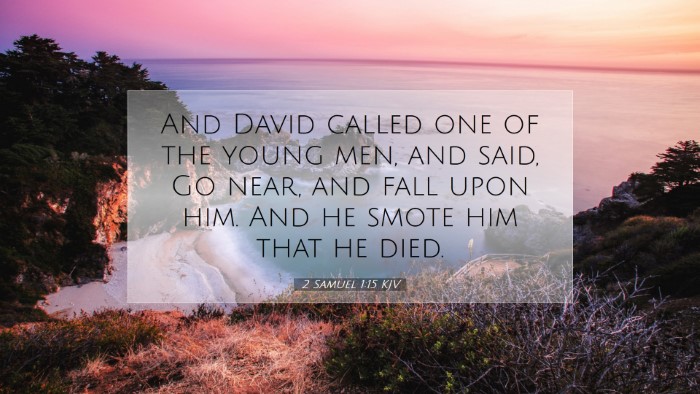Commentary on 2 Samuel 1:15
2 Samuel 1:15 (KJV): "And David called one of the young men, and said, Go near, and fall upon him. And he smote him that he died."
Introduction
The context of 2 Samuel 1:15 provides a profound reflection on leadership, justice, and the consequences of sin. This verse falls within the narrative of David's response to the news of Saul's death, revealing the complexities surrounding his ascent to power and the moral dilemmas he faces as a leader. The insights drawn from public domain commentaries by Matthew Henry, Albert Barnes, and Adam Clarke contribute to a deeper understanding of this critical moment.
Historical Context
This verse occurs after David hears of Saul's demise from an Amalekite who claims to have killed Saul. The implications of this claim are weighty, as Saul, though once David's rival, was nonetheless God's anointed king. This historical backdrop is crucial for understanding David's subsequent reactions and the moral judgments involved.
Insights from Matthew Henry
Matthew Henry emphasizes David's righteous indignation upon learning of Saul's death, demonstrating that even amid political turmoil, David held a profound reverence for God’s anointed. He reflects on the gravity of the act the young man committed, noting that he did not understand the sanctity of Saul’s position.
Henry points out that David's command to execute the young man stemmed from the principle of respecting God's authority. The act of calling for judgment on the Amalekite serves as a reminder that no one can take it upon themselves to bring harm to God's appointed leaders.
Albert Barnes' Perspective
Albert Barnes expands on the theme of divine justice in David's actions. He notes that the Amalekite expected a reward for bringing news to David, believing falsely that he would gain favor for effectively delivering Saul’s demise. However, Barnes articulates that David, recognizing the young man's actions as treasonous against an anointed king, saw the necessity for punishment to uphold justice and order within the kingdom.
Barnes highlights that this decisive action by David was crucial in establishing his rule. By eliminating a figure associated with Saul’s death, David demonstrated his commitment to a new era and justice within his reign.
Adam Clarke’s Analysis
Adam Clarke provides additional context by discussing the significance of leadership in this passage. He explains that David’s response serves not only to punish the young man but also to communicate a larger message about the consequences of disloyalty and the importance of recognizing God’s anointed leaders.
Clarke elucidates that the young man's actions were an attempt to gain acceptance within David’s court, yet tragically miscalculated. David's judgment here reflects a leader's responsibility to maintain the purity and honor of the throne, reinforcing the idea that God's approval is paramount over human approval.
Theological Implications
This swift execution has significant theological implications for understanding divine authority and justice. Leaders are called to uphold and defend the sanctity of God’s appointment, as demonstrated by David. The act illustrates the seriousness with which God’s directives are to be taken, along with the severe consequences that follow when they are ignored.
Moreover, the narrative reinforces the idea that God's plans must be achieved according to His standards, emphasizing the necessity for leaders to act with integrity and respect for divine order. David's actions set a precedent for future generations regarding the relationship between divine authority and earthly governance.
Conclusion
In conclusion, 2 Samuel 1:15 serves as a pivotal moment in David's rise to kingship, laden with lessons for leaders today. From the perspectives of public domain commentators like Matthew Henry, Albert Barnes, and Adam Clarke, we learn about the complexities of leadership, divine justice, and the importance of upholding God's appointed authority.
This passage encourages pastors, students, and scholars to reflect on their own leadership roles and the implications of their actions in the context of God’s overarching sovereignty. The story remains a powerful reminder of the need for discernment, respect for divine authority, and the harsh reality of the consequences that follow transgressions against God’s chosen leaders.


